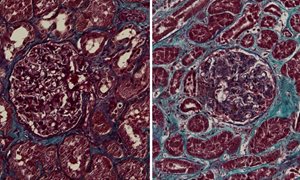
Many patients with stomach complaints who are referred for a gastroscopy actually do not need that unpleasant examination. Thanks to an e-learning module, they become more aware of their complaints and many of them refrain from such an examination. These are the words of researchers at the Radboud university medical center in a recently in JAMA Internal Medicine published scientific article. Thanks to that e-learning, doctors get more space to examine those patients who are most at risk of an underlying disorder, and reduce inappropriate care.
People who visit the doctor with stomach complaints, such as pain in the upper abdomen, belching and nausea, may in rare cases derive their symptoms from a tumor in the esophagus or stomach. To rule that out, one of the possible tests is a gastroscopy, also called an upper gastrointestinal endoscopy. With a thin, flexible tube to which a camera is attached. A doctor looks into the esophagus, stomach and first part of the small intestine. Such an examination is unpleasant for the patient and can sometimes cause complications.
Often no clear cause
Judith de Jong and Marten Lantinga, gastroenterologists in training at the Radboud university medical center, showed in preliminary research that in the majority of the people examined, this unpleasant procedure would not have been necessary in retrospect. Eighty percent of the people who underwent a gastroscopy were found to be suffering from functional stomach complaints: a diagnosis for which a gastroscopy is not necessary. Only less than 1 percent had cancer.
As a result of that study, De Jong and Lantinga scrutinized 119 patients as part of the Dutch “To do or not to do” program. They visited one of the four regional hospitals after being referred for a gastroscopy by their general practitioner. An upper gastrointestinal endoscopy was immediately scheduled for 57 of the patients, 47 of whom eventually underwent the examination. 62 patients were offered an initial 12-week e-learning period with information about their symptoms, possible causes, and gastroscopy. During and after that period, they could still opt for a gastroscopy.
No need for gastric examination
Of the group of patients who were first offered an e-learning, 38 of 62 patients still had no need for a gastroscopy after 12 weeks. 'In fact, almost all patients still had no need for a upper gastrointestinal endoscopy after a year, and we did not detect any serious diseases such as cancer in those who waived upper gastrointestinal endoscopy in that year,' says de Jong. 'It's reassuring and in line with expectations that we found few specifics.'
De Jong does place caveats on her results. 'The people who participate are motivated, because they have already been referred to us by their general practitioner. Our next step is therefore to make our e-learning directly available to everyone who has stomach complaints, via a platform such as Thuisarts.nl. By doing so, we ensure that the patient and the GP can use our e-learning immediately in case of complaints.'
Effective care
Still, the results show that care in this area can be improved by all means, says Lantinga. We see that the majority of patients with upper gastrointestinal complaints do not require a gastroscopy, and that a large proportion of patients who come to us for a gastroscopy refrain from the examination for a longer period of time. So more insight into this patient group could lead to less inappropriate care.'
The advantage of this is that many patients are spared such an unpleasant examination, and it is clearer for both doctor and patient who needs a gastroscopy. This alternative strategy makes it clearer what is causing the symptoms and how you should act accordingly. If you immediately go for a stomach examination, in many cases that won't help you any further. Moreover, more efficient selection means that we have more time for those patients with stomach complaints who really need an upper gastrointestinal endoscopy and follow-up care.
About the study
This study was conducted within the framework of the 'To do or not to do?' program. Publication in JAMA Internal Medicine: Web-Based Educational Intervention for Patients With Uninvestigated Dyspepsia Referred for Upper Gastrointestinal Tract Endoscopy - Judith J. de Jong, Marten A. Lantinga, Adriaan C.I.T.L. Tan, Michel Aquarius, Robert C.H. Scheffer, Jan J. Uil, Philip R. de Reuver, Daniel Keszthelyi, Gert P. Westert, Ad A.M. Masclee, Joost P.H. Drenth.
-
Want to know more about these subjects? Click on the buttons below for more news.
More information
Pauline Dekhuijzen

wetenschaps- en persvoorlichter
Related news items

Grants for research on magnesium deficiency and malaria Vidis for Felix Hol and Jeroen de Baaij
1 July 2022 Radboudumc researchers Jeroen de Baaij and Felix Hol both receive an NWO Vidi grant for their research, respectively on magnesium deficiency in type 2 diabetes and on malaria. go to page
Human pluripotent stem cell-derived kidney organoids for personalized congenital and idiopathic nephrotic syndrome modeling
11 May 2022 Bart Smeets, Jitske Jansen and collegues, theme Renal disorders published this article in the Human Development. go to page
ERC Starting Grant awarded to Jeroen de Baaij
17 March 2022 Jeroen de Baaij, kidney researcher the Radboudumc, receives an ERC Starting Grant worth 1.5 million euros. He will use this grant to improve the diagnosis and treatment of severe magnesium deficiencies, which can lead to epileptic seizures and muscle cramps. go to page


